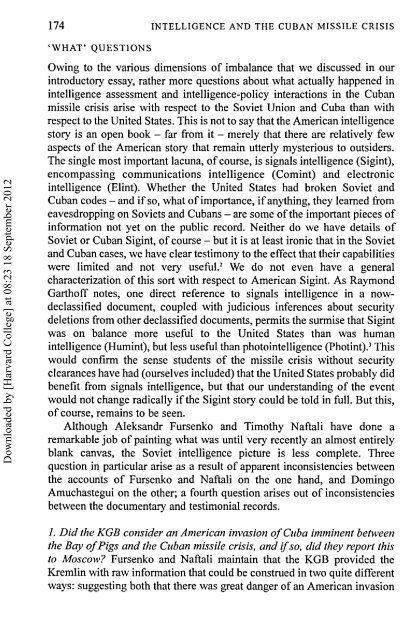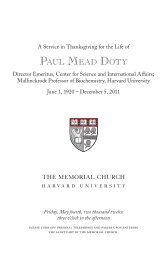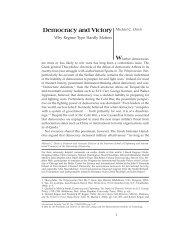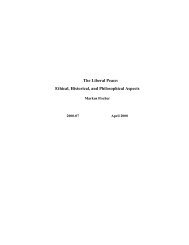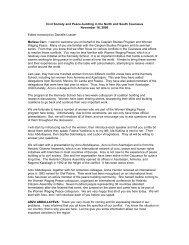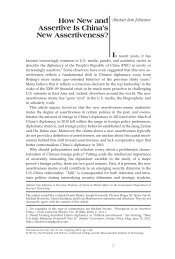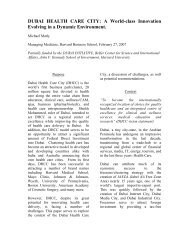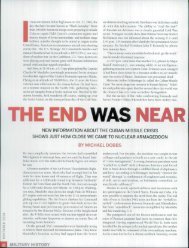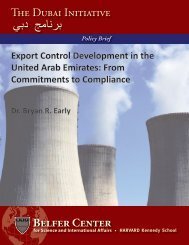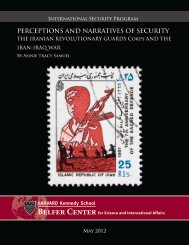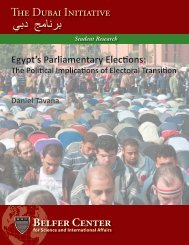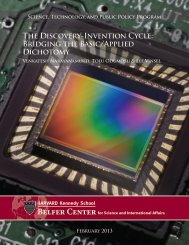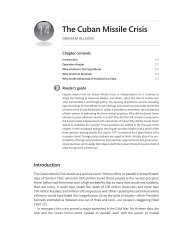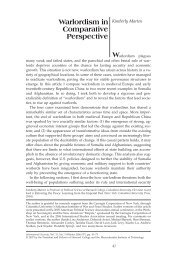The Cuban missile crisis and intelligence performance
The Cuban missile crisis and intelligence performance
The Cuban missile crisis and intelligence performance
You also want an ePaper? Increase the reach of your titles
YUMPU automatically turns print PDFs into web optimized ePapers that Google loves.
Downloaded by [Harvard College] at 08:23 18 September 2012<br />
174 INTELLIGENCE AND THE CUBAN MISSILE CRISIS<br />
'WHAT' QUESTIONS<br />
Owing to the various dimensions of imbalance that we discussed in our<br />
introductory essay, rather more questions about what actually happened in<br />
<strong>intelligence</strong> assessment <strong>and</strong> <strong>intelligence</strong>-policy interactions in the <strong>Cuban</strong><br />
<strong>missile</strong> <strong>crisis</strong> arise with respect to the Soviet Union <strong>and</strong> Cuba than with<br />
respect to the United States. This is not to say that the American <strong>intelligence</strong><br />
story is an open book - far from it - merely that there are relatively few<br />
aspects of the American story that remain utterly mysterious to outsiders.<br />
<strong>The</strong> single most important lacuna, of course, is signals <strong>intelligence</strong> (Sigint),<br />
encompassing communications <strong>intelligence</strong> (Comint) <strong>and</strong> electronic<br />
<strong>intelligence</strong> (Elint). Whether the United States had broken Soviet <strong>and</strong><br />
<strong>Cuban</strong> codes - <strong>and</strong> if so, what of importance, if anything, they learned from<br />
eavesdropping on Soviets <strong>and</strong> <strong>Cuban</strong>s - are some of the important pieces of<br />
information not yet on the public record. Neither do we have details of<br />
Soviet or <strong>Cuban</strong> Sigint, of course - but it is at least ironic that in the Soviet<br />
<strong>and</strong> <strong>Cuban</strong> cases, we have clear testimony to the effect that their capabilities<br />
were limited <strong>and</strong> not very useful. 2 We do not even have a general<br />
characterization of this sort with respect to American Sigint. As Raymond<br />
Garthoff notes, one direct reference to signals <strong>intelligence</strong> in a nowdeclassified<br />
document, coupled with judicious inferences about security<br />
deletions from other declassified documents, permits the surmise that Sigint<br />
was on balance more useful to the United States than was human<br />
<strong>intelligence</strong> (Humint), but less useful than photo<strong>intelligence</strong> (Photint). 3 This<br />
would confirm the sense students of the <strong>missile</strong> <strong>crisis</strong> without security<br />
clearances have had (ourselves included) that the United States probably did<br />
benefit from signals <strong>intelligence</strong>, but that our underst<strong>and</strong>ing of the event<br />
would not change radically if the Sigint story could be told in full. But this,<br />
of course, remains to be seen.<br />
Although Aleks<strong>and</strong>r Fursenko <strong>and</strong> Timothy Naftali have done a<br />
remarkable job of painting what was until very recently an almost entirely<br />
blank canvas, the Soviet <strong>intelligence</strong> picture is less complete. Three<br />
question in particular arise as a result of apparent inconsistencies between<br />
the accounts of Fursenko <strong>and</strong> Naftali on the one h<strong>and</strong>, <strong>and</strong> Domingo<br />
Amuchastegui on the other; a fourth question arises out of inconsistencies<br />
between the documentary <strong>and</strong> testimonial records.<br />
1. Did the KGB consider an American invasion of Cuba imminent between<br />
the Bay of Pigs <strong>and</strong> the <strong>Cuban</strong> <strong>missile</strong> <strong>crisis</strong>, <strong>and</strong> if so, did they report this<br />
to Moscow? Fursenko <strong>and</strong> Naftali maintain that the KGB provided the<br />
Kremlin with raw information that could be construed in two quite different<br />
ways: suggesting both that there was great danger of an American invasion


